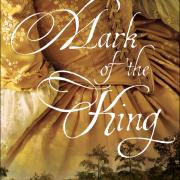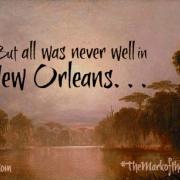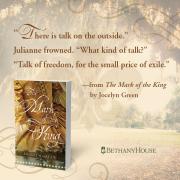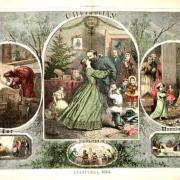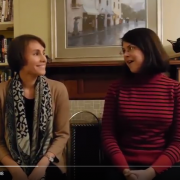*Today's post is written by my friend, bestselling author Shannon Popkin! I've been reading her new book Control Girl with my morning devotions and can't recommend it highly enough. I'm delighted that she's here today to share with you! Stay tuned until the end of this blog post for details on a give-away!
One day, when my kids were preschoolers, we had a bat stuck between our sliding glass door and the screen door. Its evil-looking face was right up against the glass, and with its expanded wings it looked like it was hissing curses at us.
I wanted this bat gone. I told my husband so, in no uncertain terms.
The following afternoon, I asked, “So what did you do with the bat?” I had envisioned him beating the thing to death with a shovel and burying it six feet under. But he said, “Oh, I just tapped the screen and it fell off into the grass.”
“You WHAT???!” I exclaimed in disbelief, leaping to my feet. Just then our toddler picked up something from the yard to put in his mouth.
It was too much.
I ran screeching into the yard like a crazy person and swooped up little Cole, then hollered for the other kids to come inside right that instant.
What sort of man sends his own children out into a bat infested yard?! I was incredulous. I was furious. I was indignant.
As I scrubbed the kids’ fingers and toes and washed Cole’s mouth out, my husband wandered inside. I stamped my foot and ordered him to get outside and search for that bat!
“Shannon, that’s ridiculous,” he said, rolling his eyes. “That bat is long gone.”
“Did you see it fly away? Did you? Did you?” I was leaning forward with my eyes bulging, my finger jabbing the air. I’m sure I looked quite lovely.
Knowing things would only escalate from here, my husband went out and began pacing back and forth across our yard. It’s one of those ugly “Control Girl” memories I wish I could forget.
Craving Control
No bat ever turned up in our yard. What did turn up, however—with ever increasing intensity—was my anger, anxiety, disrespect, and obsessive perfectionism. And as ugly as those things are, there was something even uglier at their root: A deep, unhealthy craving for control.
I didn’t think of myself as controlling. I was too focused on the things that needed to be controlled!
I find that many women are blind to their own struggle with control. We do see the problem in other people. And other people see it in us. But we tend to not think of ourselves as Control Girls.
It’s probably because our intentions are so good! We’re not trying to frustrate or exasperate anyone. We’re just trying to make everything turn out “right” for the people we love, and the situations that we’re passionate about. But when we take matters into our own hands, and contend for our own version of a Happy Ending, we only make everyone (ourselves, included) miserable.
Friend, are you a Control Girl? God never designed for you to shoulder the burden of trying to control everything. Doing so only brings out the worst in you.
Control doesn’t belong to us; it belongs to God. He invites us to live accordingly.
Exposing the Root
Exposing my inner Control Girl—even to myself—was counterintuitive at first. I had grown comfortable with letting my control issues lurk in the dark, unswept corners of my heart’s basement. But if I was ever going to change, I had to face my hideous inner Control Girl. To do that, I developed a plan for shining a huge flashlight in her face.
My “flashlight” is really a question, that I’ve learned to ask myself. Whenever I feel anger, fear, or anxiety rising, I ask, “Ok, Shannon. What are you trying to control here? Or what do you think you’re losing control of?”
I find that often my anger, frustration, and anxiety are the result of my inner Control Girl stomping her foot and demanding control again. I’m erupting in anger because I’ve lost control over a person or situation. Or I’m in a fretting frenzy because I can’t stand to not have control. Using these emotional reactions as indicators of a deeper struggle has helped me shine a flashlight on my inner Control Girl.
Take the situation with the evil-looking bat, for instance.
What was I most upset about? If I’m honest, I wasn’t throwing a fit over the actual threat of the bat. My kids had been playing out doors all morning, and if they had come across a bat in the yard, I have no doubt that they would have run to me in alarm. No, what I was really reacting to was a husband I couldn’t control.
By stamping my foot and insisting that he pace back and forth in the yard, I was saying, “How dare you fail to be the protective daddy that I want for my children? That makes me feel insecure! It makes me worry that everything’s out of control! So to punish you and make sure this doesn’t happen again, I’m going to throw a disrespectful tantrum! I am demanding control!”
A New Path
I’ve taken the path of a Control Girl long enough to know that it never leads to the things I want in life. It doesn’t lead to security, because control seems to always slip from my grasp. It doesn’t bring peace, because I’m either fretting or throwing fits which create tension. And it doesn’t offer hope, because the Happy Ending I have all worked out in my head is just an illusion.
Thankfully, Jesus came to lead Control Girls like me down a different path. Because of Jesus, we can find freedom from that bent we have toward sin. We can retrain our hearts to say no to ourselves and yes to God.
For the Control Girl, here’s what that means. We cannot continue to give in to that frantic, urgent voice of our inner Control Girl, saying, “You have to do something! You have to do it right now!” We must stop running ahead and trying to make everything turn out right, according to our own small, limited perspectives. Rather than insisting on having control, we have to choose—in big ways and small—to surrender control to God.
“But wait,” you say. “Does this mean I just ignore the bats flung into my yard or shrug off a less-than-careful husband?” Perhaps you’re facing situations that make my bat story seem rather insignificant.
Giving God control doesn’t mean that we cast off responsibility to parent well or live responsibly. And it doesn’t mean that we opt out of working through differences or problems with our husbands or others.
The Jesus Girl just approaches these challenges with a new mindset. Rather than desperately clawing after control, she has a settled peace knowing that nothing has slipped from God’s hand or escaped His attention. He is God, and she can trust Him—even with a husband who doesn’t take care of bats the way she would like.
Surrender
Surrender isn’t easy. It’s a gritty, uphill climb. But a lifestyle of surrender leads to peace—knowing that God’s in control, and freedom—knowing that I don’t have to be. The steady climb of surrender, saying as Jesus did, “Not my will but yours be done,” is what turns me from Control Girl to Jesus Girl.
Friend, are your shoulders sagging under the strain of trying to control everything? What are you fretting or angry about? What is God asking you to surrender to Him? Won’t you lay down your burden of control, and find rest?
Lord, I am so thankful that I am not in control, and that You are. Please help me to live like both of these are true.
In author and speaker, Shannon Popkin’s new book, Control Girl: Lessons on Surrendering Your Burden of Control from Seven Women in the Bible, she mines the stories of seven Control Girls in the Bible for lessons on control, ourselves, and God. Find more from Shannon here. Purchase her book at Amazon, ChristianBook, or BarnesandNoble.
Give-Away!
For details on a grand prize give-away valued at more than $100, visit here!

